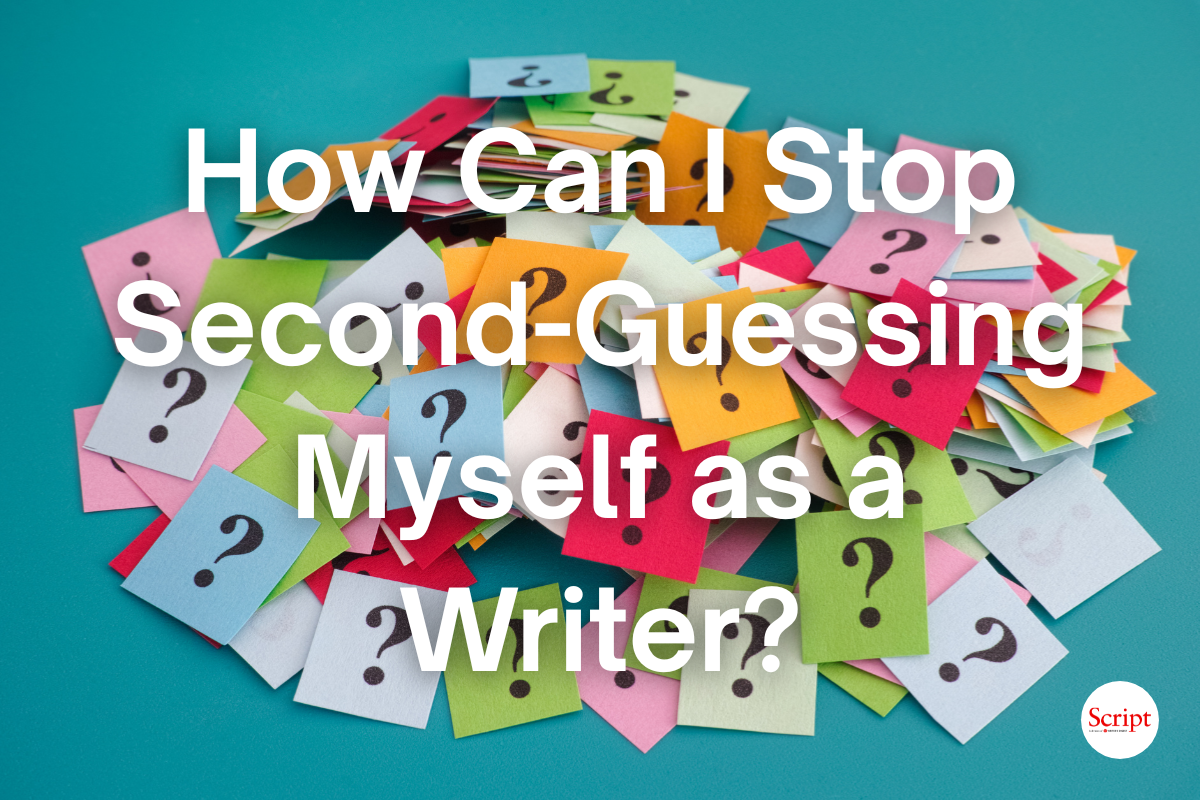Recovering From a Writer’s Dark Night of the Soul
Writing coach and Called to Write founder Jenna Avery responds to a writer facing a dark moment about the point of writing.
Welcome to “Ask the Coach.” As a writing coach, I answer questions from writers about making the work of writing happen, tackling craft, business, and personal questions along the way. (Have a question you’d like answered? Check the details at the end of the article about how to submit one.)
Today I’m responding to a comment from a writer online about having a moment of wondering why she’s still trying to write.
I love the positive spin at the end! I had a similar response, which was, “My take is that it means you're on the verge of a breakthrough with your current script!” And, I immediately had several further thoughts on the subject, so I asked Andrea for permission to elaborate here, which she granted.
Let’s dig in.
1. Know that dark nights of the soul are real and normal, yet painful.
Andrea mentions having “one of those nights.” I suspect most writers have those nights from time to time, sometimes even in a long, seemingly unending string of nights. Ouch. They are real, normal, and yet painful. Every creative — at some point — questions their work and their place in the world. Is that a bad thing?
On the one hand, I’ve seen writers spend a lot of time questioning whether they really, truly want to write instead of actually writing, which could also feel like a “waste.” Is it? Questioning, perhaps, is a trait that might even lend itself to writing and inspire us to become writers. After all, many of us sort out what we think, how we feel, and even process issues we’re facing on the page. Questioning also allows us to look at life, themes, and characters from multiple angles, which is part of what makes writing so provocative and interesting. And isn’t a big part of the enjoyment readers and viewers get due to seeing things from other perspectives?
So perhaps our proclivity to question is, in fact, a good thing.
On the other hand, sometimes writers get stuck in the questioning and struggle to move past it, which becomes paralyzing and deadening. It’s valuable to notice how long these doubts and questions last. Is this a blip — just a moment of darkness? In that case, notice it, but don’t make it global or draw career-level conclusions about writing or not writing. If it’s a longer lasting state of mind, however, then it’s worth doing some personal interrogative exploration on the subject (see #2, below).
One last thought: There is always value in the difficult moments in life — especially for writers. Once we live through these challenges, we have more empathy for the obstacles our characters experience, too, which only means we can write more authentically.
2. Ask yourself what it would look like not to write.
If you’re in a deeper dark night of the soul — not just a momentary blip — get out your journal. Ask yourself, “What would it be/feel/look like not to write?” Early in the pandemic days, when I was asking myself if writing was worth it (especially when death was like a real probability), I journaled what it would feel like to stop writing. It didn’t take long to realize — at least for me — that not writing would feel like giving up, and that felt bleak; too bleak. Even though I’m something of an apocalyoptimist, I chose hope instead, seeing writing as an act of optimism to carry myself into the future.
Although it might feel scary, these deep, dark nights of the soul are excellent fodder for equally deep moments of clarity. While your answer may involve deciding not to continue writing (or taking a break for a bit), you’ll want to make that decision from your deeper inner guidance, not a place of fear. That’s why journaling is such a great tool — it helps you access the deeper parts of yourself and the answers you hold within.
3. Remind yourself why you love to write.
Along similar lines, remind yourself what inspired you to start writing in the first place. Setting aside the outcome (the “what’s going to come of it” part), you were drawn to write for a reason. For many of us, writing feels like a calling, something we were born to do, even if we’re not seeing the results we’ve dreamt of yet.
There may be themes you feel called to write about. Messages you want to share. Genres you delight in exploring. Characters counting on you to get their stories out in the world — people you love who literally can’t and won’t exist without you. Tap into that love to fuel yourself through the darker moments when they come.
4. Hold that no writing is ever wasted.
Whether your current script-in-progress goes anywhere, no writing is ever wasted. Every word we put on the page, every sentence we craft, and every story we design becomes part of our writer’s DNA and informs what we do in the future. That might manifest in your writing future scripts, but can also look like simply growing and becoming more fully yourself as a human being on this planet. Always a good thing.
And, writing “not going anywhere” is so, so relative. I’ve recently dusted off my first script, which I love, but has never truly worked — and by that I mean, the story as written so far isn’t yet pulling its weight nor delivering fully on the concept — and I’ve finally cracked the core of a rewrite I’m excited about implementing.
So not only is writing itself not wasted, sometimes stories themselves have their own timeline.
5. See frustration as a sign of an impending breakthrough.
As I said in my original response to Andrea’s post, I’ve found that frustration with writing often builds up just before a big breakthrough or insight with a story, usually because it forces us to try something new or look at the project from a new perspective.
In my case, when I’m especially stuck (read: desperate, ha) I tend to handwrite notes to and from my main character (answering in their voice) to discover new story insights, reach out to my mentor or a writing colleague to hash things out, or start asking myself questions about what I’m trying to do with a particular section I’m working on. Invariably, a revelation will occur.
The frustration becomes a tool — a motivating force — to look at things in a new way. And to find new and exciting answers.
6. Focus your appreciation on the process of writing.
Since we can’t control the outcome of our work — whether it will sell, get produced, or even be successful if it does — focus on the enjoyment you can find in the process of writing and creating as much as you can. How can you heighten your enjoyment of the process of writing? Of creating stories and worlds?
I’ve found great enjoyment in telling myself stories I love and would love to see on screen, and finding ways to tell them that feel deeply satisfying and exciting. I also try to make the experience pleasurable for myself, with inspiring music, tasty drinks, and writing alongside others who are excited about writing too.
7. Create your own outcomes.
A last thought: Although we can’t control the outcome of a script selling or being made into a successful film, as writers, we have options for what we do with our work.
For example, you might write a novella version of your finished script, or work with an artist to make a graphic novel version of your story. That way, your story still has someplace to go. I’ve also found some personal satisfaction in having printed versions of my scripts, both to refer to and to have as physical evidence of the hours of work I’ve poured in (even while I generally avoid printing to save paper!) — and in putting them on my website with images and blurbs so they can shine.
Thank you again, Andrea, for allowing me to expand on my response to you here.
Warmly,
Jenna
That’s a Wrap
I’ve yet to meet a writer who doesn’t have dark moments from time to time. While this means we’re not alone in having these experiences, it sure can feel that way. Taking time to reflect and support yourself through the dark moments will help you come out the other side more committed and focused on what you truly want to do.
Thank you for reading, and happy writing.
Screenwriters, what challenges do you run into that you'd love to see us address in our articles? Take our short survey here, submit your question to be answered anonymously via my online form here, or email me directly at askthecoach@calledtowrite.com. Look for answers to selected questions in my monthly “Ask the Coach” column on the third Thursday of the month.
Find me on X/Twitter @JennaAvery and Bluesky @jennaavery.bsky.social.







